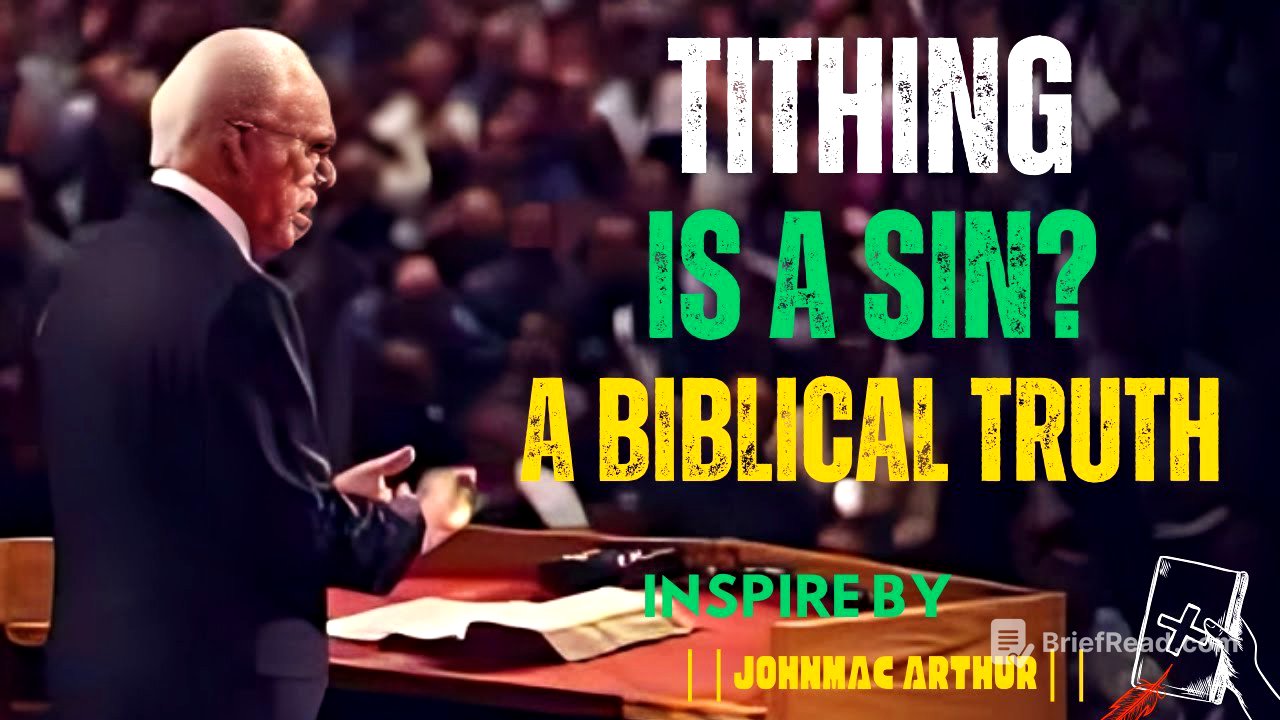TLDR;
This video addresses the controversial topic of tithing in Christianity, questioning whether it is a sin if not practiced and examining the scriptural basis for giving. It contrasts Old Testament laws on tithing with New Testament teachings on grace-giving, emphasizing that believers are now under grace, not law. The video warns against legalistic interpretations of tithing, which can lead to compulsory giving and distort the gospel. It advocates for cheerful, voluntary, and spirit-led generosity, highlighting that God desires a heart of worship rather than a mere transaction.
- Tithing was a mandated system under the Old Testament law for the nation of Israel.
- The New Testament emphasizes grace-giving, which is voluntary and driven by love, not legal obligation.
- Legalistic tithing, which imposes tithing as a binding law, undermines the gospel of grace.
- Biblical giving is generous, sacrificial, cheerful, and spirit-led, focusing on the heart rather than a fixed percentage.
Introduction & Welcome 🙌 [0:00]
The video begins by introducing the question of whether tithing is a sin, noting that many churches passionately advocate for it as a divine obligation. The speaker emphasizes the importance of examining what scripture truly teaches, setting aside tradition and human opinions to focus on the inherent and sufficient word of God.
Why the Topic of Tithing is Controversial 🤔 [2:15]
The speaker introduces the concept of grace-giving, contrasting it with the mandated tithing of the Old Testament. In 2 Corinthians 9:7, Paul teaches that giving should be decided in the heart, not reluctantly or under compulsion, because God loves a cheerful giver. This voluntary, love-driven approach to giving in the church differs significantly from the legal requirements of the Old Testament.
Old Testament Laws on Giving 📜 [5:40]
The video explains that tithing in the Old Testament was a mandated system within the covenant God made with Israel, not merely an act of generosity. It highlights instances like Abraham's offering to Melchizedek and Jacob's vow as personal commitments, not universal laws. The formal command to tithe came as part of the Mosaic law, requiring a tenth of the land's produce to be given to the Lord. This system supported the Levitical priesthood, national feasts, and the poor, involving more than just a single 10% contribution. Numbers 18:21-24 details how the Levites received tithes from other tribes, while Deuteronomy 14:22-29 introduces the "festival tithe" for communal meals during religious festivals. Additionally, Deuteronomy 14:28-29 mentions a "poor tithe" every three years for the needy, making the total required contribution about 23.3% per year. Failure to comply was considered disobedience to God, as highlighted in Malachi 3:8-10, which rebukes Israel for robbing God by withholding tithes and offerings.
Tithing in the New Testament Era ✝️ [9:25]
The discussion shifts to the New Testament, emphasizing that Jesus fulfilled the law, ending the old covenant and establishing a new one. The temple is no longer the center of worship, and believers are now the temple of the Holy Spirit. The Levitical priesthood is obsolete, with Christ as the high priest. Jesus mentioned tithing in the Gospels, but it was to rebuke the Pharisees for their hypocrisy, as seen in Matthew 23:23. This statement was made before the new covenant, so it is not a binding command for the church today. Hebrews 7 is sometimes cited to support tithing, but it actually highlights the superiority of Christ's priesthood over the Levitical system. After Christ's resurrection, the New Testament provides no command for believers to tithe.
Jesus’ Teaching on Money & Heart 💖 [14:10]
The video explains that giving in the church is not about meeting a legal requirement but about responding to God's grace with generosity, joy, and love. 2 Corinthians 9:7 states that each person should give as they have decided in their heart, not reluctantly or under compulsion, because God loves a cheerful giver. This principle is the essence of grace-giving, which is a matter of the heart, not an external obligation. Under the new covenant, giving is a voluntary act of worship motivated by gratitude for God's grace in Christ.
The Apostles’ Perspective on Generosity 🤲 [18:30]
The speaker continues by highlighting examples of grace-giving in the early church, such as in Acts 2:44-45 and Acts 4:32-35, where believers voluntarily shared their possessions with one another. This was not a mandated redistribution of wealth but a natural outpouring of love. The account of Ananias and Sapphira in Acts 5 illustrates that giving was entirely voluntary, and their sin was in lying about the amount they gave, not in withholding part of it. Paul reinforces this principle in his letters, commending the Macedonian churches in 2 Corinthians 8:1-5 for their extraordinary generosity despite their poverty. He emphasizes that giving should be a willing and joyful act, not setting a specific percentage but valuing the heart behind the giving.
Dangers of Legalistic Giving 🚫 [23:55]
The video warns against the dangers of legalism, particularly the imposition of tithing as a requirement for believers under the new covenant. Legalism undermines the gospel of grace and distorts Christian giving by reintroducing obligation and merit. It is the belief that righteousness is attained through human effort rather than faith in Christ alone. The speaker references Matthew 23:4, where Jesus rebukes the Pharisees for enforcing heavy burdens on others. Misusing Malachi 3:8-10 to pressure believers into mandatory tithing ignores the fundamental change brought by Christ's fulfillment of the law.
God’s Desire for Cheerful Givers 😊 [27:20]
The speaker underscores that the motivation behind giving should be love, gratitude, and joy, not fear of curses or being labeled unfaithful, referencing 2 Corinthians 9:7. Giving under compulsion is not biblical giving but religious coercion. Legalistic tithing creates a false hierarchy where those who give more are seen as more spiritual, contradicting Jesus' commendation of the poor widow in Luke 21:1-4. The New Testament standard for giving is a heart fully surrendered to God, not a fixed percentage.
Misinterpretations & Common Myths ❌ [31:40]
The video addresses the transactional mindset fostered by legalistic tithing, where people see God as a vending machine, expecting financial blessings in return for giving 10%. This is a distortion of biblical teaching on God's provision and a form of the prosperity gospel. The speaker clarifies that while God blesses generosity, his blessings are not always material and do not operate on a fixed percentage system. The greatest blessings of the Christian life are spiritual, not financial.
True Biblical Giving in Practice ✅ [35:15]
The video concludes by emphasizing that the imposition of mandatory tithing distorts the gospel itself and reintroduces legalism that Christ came to abolish. The New Testament consistently affirms that believers are not under the law, but under grace, as stated in Romans 6:14. Requiring tithing as a legal obligation denies the sufficiency of Christ's fulfillment of the law. Paul warns against returning to the bondage of the law in Galatians 5:1, stating that any legal requirement to the gospel nullifies grace. The book of Hebrews further emphasizes the superiority of the new covenant over the old, with Christ as the believer's high priest. The apostles never imposed tithing as a requirement, and Paul's teaching on giving is rooted in grace, generosity, and voluntary worship, as highlighted in 2 Corinthians 9:7.
Final Thoughts & Prayer 🙏 [38:55]
The video concludes by reiterating that tithing as a requirement misrepresents the gospel and distorts Christian stewardship. Under the old covenant, tithing was a form of national taxation, while the New Testament emphasizes grace-giving, which is voluntary and driven by love.









